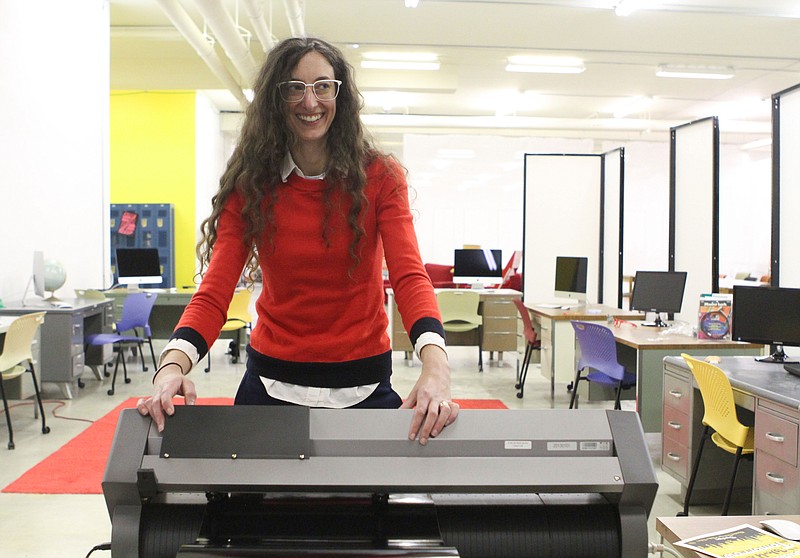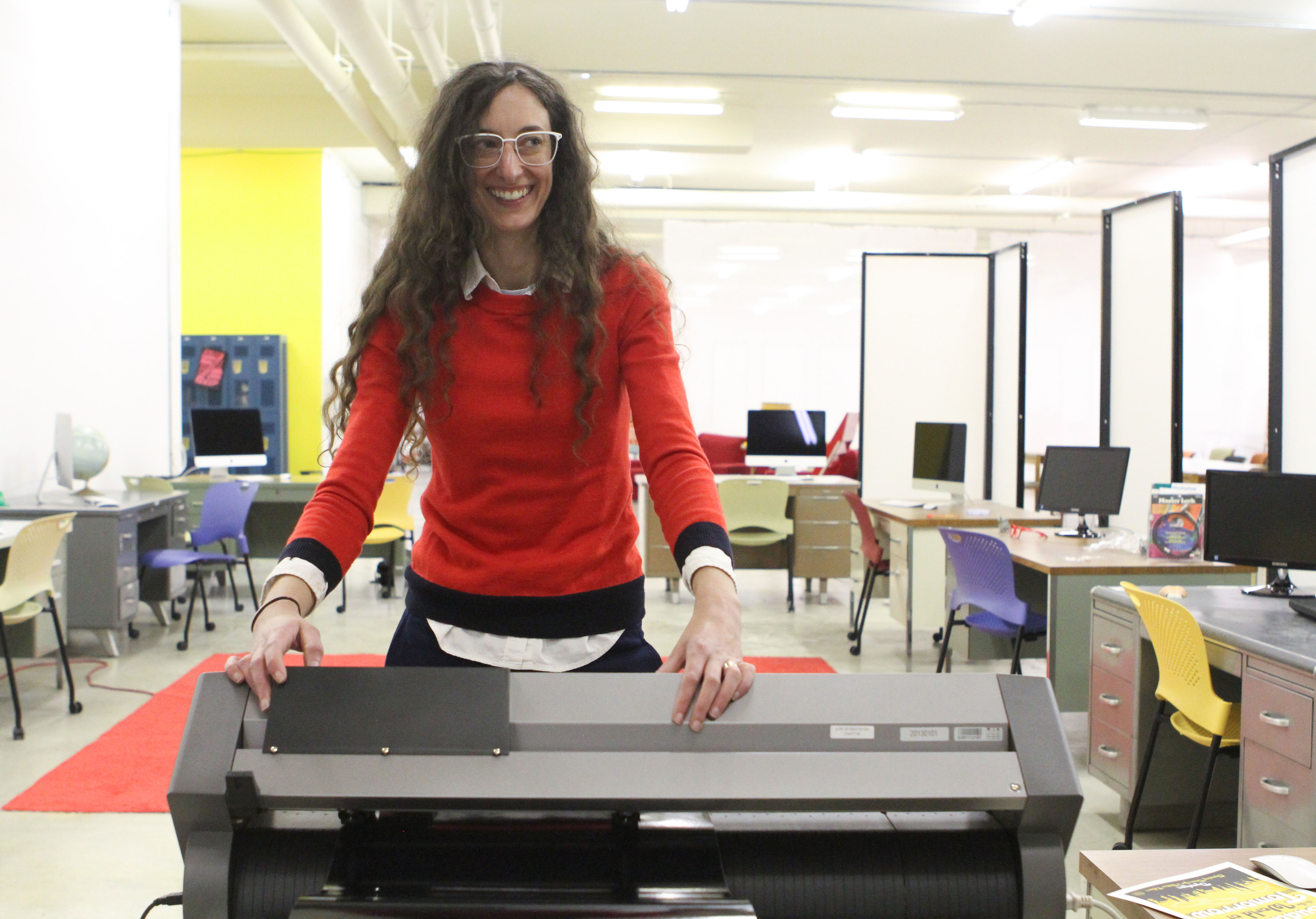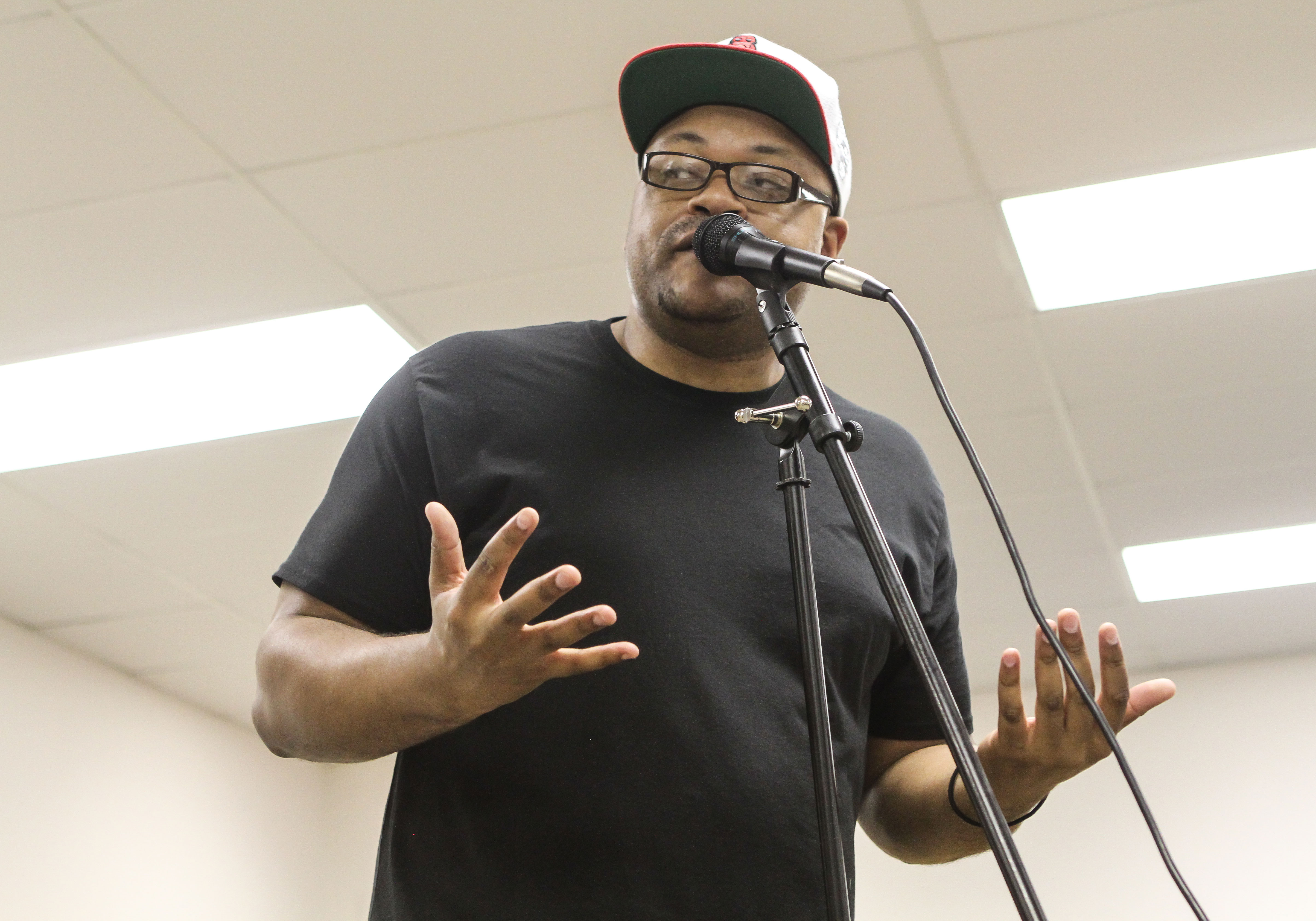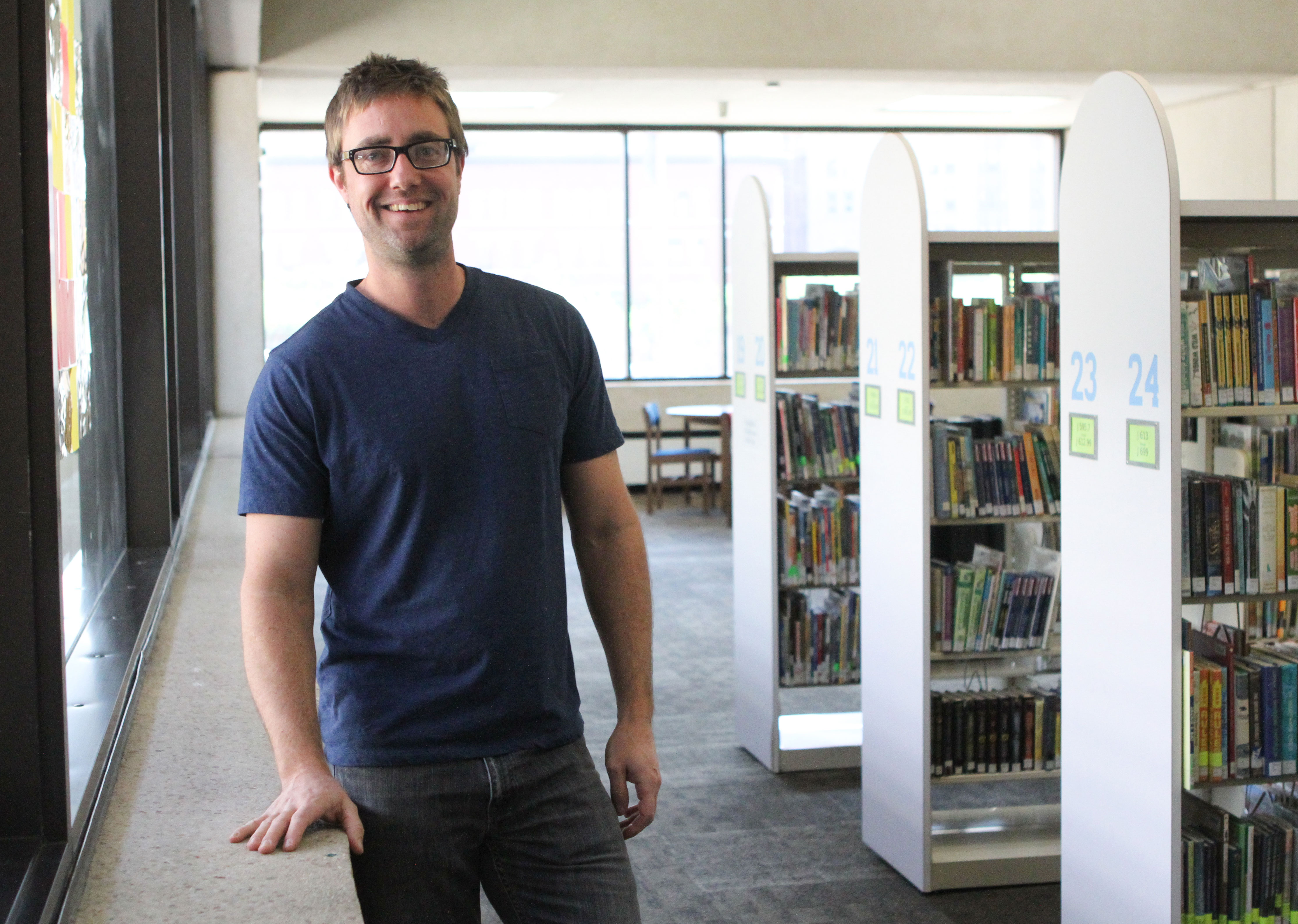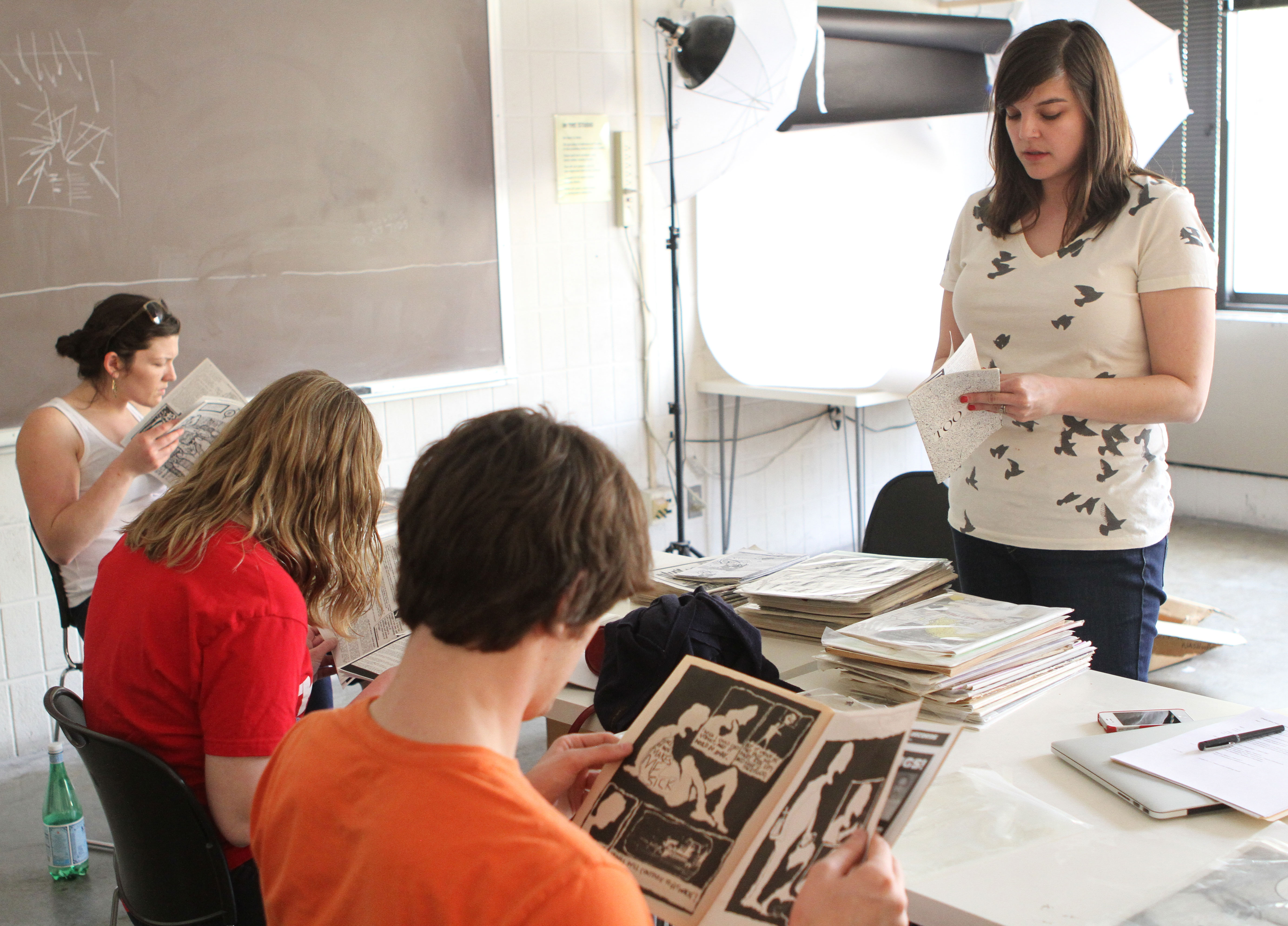It's common to hear around Chattanooga that the city is changing. A new restaurant pops up every week; there are startups and collectives, new venues and businesses. Any native will tell you Chattanooga is not the same city it was 20 years ago - or even 10 years ago. Who are the people who are changing the fabric of our city right now?
Changing Chattanooga is a series highlighting people on the rise. Maybe they've been in the news, or maybe they're just one of those names everybody knows. Maybe they're quietly making headway on their vision for their community.
This installment focuses on people with a passion for spreading information, whether in the form of hard-bound literature, a pen and ink drawing, spoken word or a coded message.
MEG BACKUS
Backus came to the Public Library in 2012 after a stint at the Onondaga Public Library in Cicero, N.Y., where she was a part of the LibraryFarm, a community garden where patrons can "check out" plots.
She likes libraries because they provide a "cultural commons" for communities. And far from the idea of stodgy, rule-bound librarians, she has viewed her work at the 4th Floor of the library - which she calls a "beta space, a hacker space, a maker space" - as a place to play and experiment, crowd-sourcing ideas for projects and seeing what sticks.
"Someone came in and said they wanted to learn how to sew," she says. "We said, 'How can we make this happen?' and now we have a sewing machine that people can use. That's kind of how it works."
At a recent Arduino Hack Night - a workshop where attendees play with miniature computers called microcontrollers - Backus showed a group how to rig up the system to identify different types of foods. Why build a rudimentary computing system that can tell spaghetti from a sandwich? The answer is a solid "just because."
"I love the weird stuff, I love the stuff that there will never be a market for but someone wants," she says.
Occupation: Librarian at the Downtown Public Library, "Chief Maker" on the 4th Floor
Native or transplant? Transplant, from Michigan
You're originally from Michigan and before this you worked in upstate New York. What differences do you see between those places and Chattanooga? Why Chattanooga?
I'm in Chattanooga because I want to make the public library that should exist, the library worthy of what the public deserves. The biggest difference in Chattanooga is that I'm surrounded by other people who are equally dedicated to a similar challenge. The whole city--every level and sector--seems sincerely committed to improving the quality of life in Chattanooga, and eager to support each others' ideas and efforts. That seems rare and special.
Talk about the 4th Floor project at the library - what is the fourth floor? What does it provide?
Whereas libraries have traditionally been focused on access to materials for consumption (reading, watching, listening), the 4th Floor is a space that provides access to tools to facilitate content creation. It's our response to the growing importance and complexity of participatory culture. Think about how the Internet moved from read only to read/write. The 4th Floor is the locus of that same transition in the physical library. It's a place that appreciates the immense amount of learning and opportunity encased in Do-It-Yourself projects and peer-to-peer sharing.
Favorite place to read in Chattanooga:
I've become someone who uses audiobooks a lot, which I listen to while walking my dog, so the walking bridge and some of those paths and parks by the river are my favorite. There are people but no background music and no cars, which make them the best places.
CHRISTIAN COLLIER
Christian Collier performs spoken word, has sold hundreds of copies of his chapbook and just finished his first album. But it's all poetry to him.
"With everything I do, I never want to be boxed in," Collier says.
His Speakeasy open-mic and Manifest series provided a platform for poets of all pedigrees in town to perform their work. In many ways, Collier is the face of spoken word in Chattanooga; he calls himself an "ambassador" for the craft he deems vital.
He once embarked on an entire year dedicated completely to poetry that he called "The Forced Exposure Tour."
"If I could get up and speak, I would perform. Everywhere I possibly could. It laid the foundation for everything," Collier said.
And Collier doesn't plan on stopping any time soon. He's a mainstay at the Barking Legs Theatre, and he chronicles his upcoming performances via his blog. You can also see him April 10th at the Hunter Museum of Art in a performance inspired by their exhibit on the Harlem Renaissance.
Occupation: Family Service Advocate/Artist
Native or transplant? Transplant
How did you start with poetry and how has yours evolved?
I started studying and writing poetry in 1998 in an attempt to woo a girl I went to high school with. Very quickly, I fell in love with the craft and the possibilities.
My work has evolved a great deal over the years, actually. I think that it's become a lot easier to determine what a piece needs and to allow my voice and personality to come through.
What's the future for poetry and spoken word in Chattanooga?
Good question! I think the future for poetry in the city is that it'll continue to grow. Since 2009, more and more opportunities for readings have popped up, and I feel like that's going to continue, especially with all of the coffee shops that are opening here. Historically, they've been great venues for poetry. I also think that more funding will come through for projects that utilize spoken word and poetry, in general, either as educational tools or otherwise.
CHAD PREVOST
Chad Prevost always knew he wanted to be a writer, but he'll be the first to admit the life of a writer isn't easy. He is the author of two collections of poetry and a novel ready to be published. He has taught at the university level and has run local publishing house C&R Press since 2006. But he is continuously playing catch-up and trying to remain fluid in the ever-changing world of literature, publishing, readers and writers.
"I think people are reading more than ever," he says. "Are people sitting down and tackling 600-page novels? That's becoming rare."
Prevost blogs daily about "creativity and life exploring," and has challenged himself to posting 400 entries by the end of the year. His next project is Upstart Creative Agency, a line of mini e-books funded by a MakeWorks grant. As for the prognosis for literature in Chattanooga? That's a story yet to be finished.
"There are a lot of ways to be a writer, and I'm finally embracing that, I think," says Prevost. "Chattanooga is a great place to be, because there are a lot of startups and projects that need quality content. I'm always looking for creative, agile, meaningful projects to be a part of."
Occupation: Owner and publisher at C&R Press, novelist, poet, and writer at his blog, Hanging Chad.
Native or transplant: I grew up in northern California and then in Richmond, VA. We lived in Atlanta for five years before moving up here. After ten years, though, and having a lot of family here, it feels like home.
Why have you stayed in Chattanooga, and what do you see in store for the city?
We love Chattanooga. Have ever since we've moved here. We have so many good friends, and family here now too, and they all love Chattanooga. Coming from Atlanta where we lived for five years, the traffic alone spoils you. It's beautiful. There are lots of reasons why we've stayed. An emerging realization for me is breaking out of traditional roles and expectations of what it even means to be a writer. There are so many people and start-ups around town doing so many fascinating and powerful things, I think that has been an influence. I'm partnering with people and their awesome ideas and providing "content" and sharing in becoming a part of what they're doing and vice-versa.
How do you think literature and the dissemination of literature is changing? How has the internet changed reading and writing?
I think people are reading more than ever. They're just not reading the same content. We're all trying to keep up with what is being read and where--and why. Are people sitting down and tackling 600-page novels? That's becoming rare. Everyone wanting to be read but hardly reading others? That's the new normal. So there's a ton of sub-par work out there.
Where is your favorite place to read in Chattanooga?
I kinda like the Raccoon Mountain Room at UTC. I have some good memories associated with that space. I don't know. I'm excited about reading at The Camp House this Friday evening at Michael Gray's River City Nights program!
AGGIE TOPPINS
Aggie Toppins began producing zines during her graduate program at the Maryland Institute College of Art, but her work in the medium has really flourished in Chattanooga, almost out of creative necessity. ?
When Toppins accepted a post teaching graphic design at UTC, her side work didn't move with her. She had no clients, no new projects or a local network. But returning to zines, self-published magazines for small circulation, provided Toppins with an artistic outlet.?
"Zines helped me to quickly process ideas and study visual form," she says. "The unprecious format was liberating. I knew if something didn't work out in one issue, I'd soon be on to another one."?
Toppins has spread her enthusiasm to the classroom, where she assigns zine projects coupled with a lecture on the history of zines. Students have latched on. They bring in zines ordered from online and started a zine club, The Society of Ink and Paper, where they share and collaborate on zines.
Interested in learning about zines? Toppins and her students will be hosting zine workshops through AIGA Chattanooga on April 7th and The Chattery on April 26th. She is also curating a zine collection at the Public Library, to be unveiled at Zine Fest May 10th.
Occupation:
I'm a graphic designer and a professor of graphic design at UTC.
Check out her website here.
Why Chattanooga?
I came to Chattanooga to teach at UTC. I was deeply impressed by the students and I felt philosophically aligned with the Art Department faculty. It's a gem of a program. I'm very proud of our work.
What are zines and why do you love them?
Zines, simply put, are self-published books. They are usually cheaply produced in small editions. They often take the form of small magazines, experimental artist books, amateur journalism, or personal narratives.
Zines began as a kind of "unofficial" media-the voice of underground culture. Groups that didn't receive mainstream media attention, like political dissidents, self-identified punks, and even science fictions fans started making zines because they wanted to be represented. They wanted to share their joys and beliefs with like-minded people.
What's the future for zines in Chattanooga?
Over the last four months, I've been working with the Chattanooga Public Library to build a permanent collection of zines for the Maker Space on the 4th floor. We've been lucky to acquire historically significant zines as well as many new zines from all over the world. There will also be a large number of local and regional zines. Our collection spans a wide range of genres and will hopefully appeal to many different interests.
